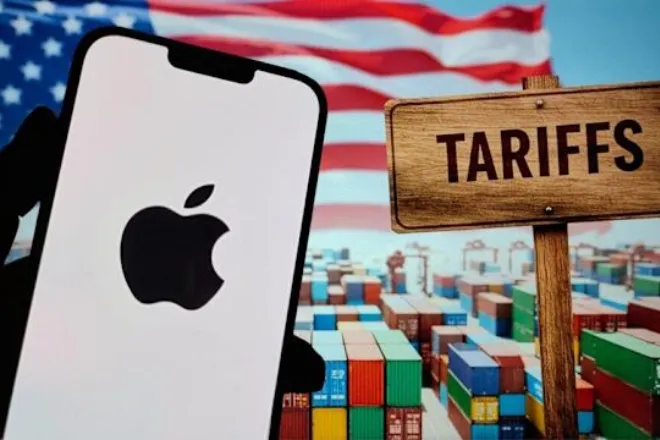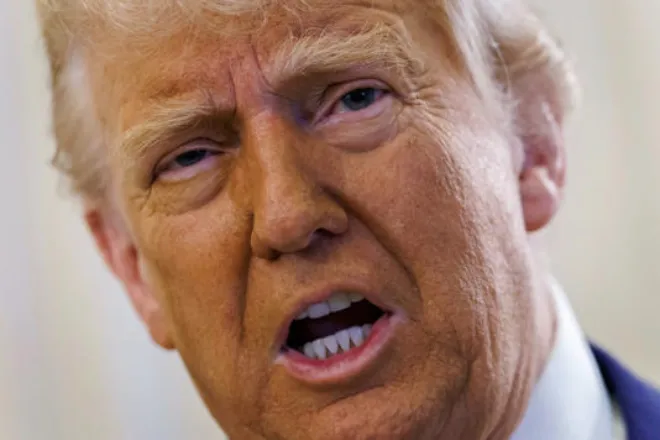President Trump’s aggressive tariff rhetoric has delivered fresh shocks to investors, with major indices extending losses as trade war tensions between the US and European Union intensify through escalating tariff threats.
Contents
- Trump’s 50% EU Tariff Rhetoric Intensifies
- Smartphone Tariff Rhetoric Expands to All Foreign Devices
- Immediate Market Response to Tariff Rhetoric
- Tone Shifts to Trade Confrontation
- EU Response to Escalating Tariff Rhetoric
- Economic Impact of Tariff Rhetoric Implementation
- Apple CEO Meeting Influences Tariff Rhetoric
- European Leaders React to Tariff Rhetoric
- EU Countermeasures to Tariff Rhetoric
- Trade Negotiations Prove Challenging
- Conclusion: Tariff Rhetoric Reshapes Post-G7 Trade Relations
- About H2T Finance
Trump’s 50% EU Tariff Rhetoric Intensifies
President Donald Trump has reinforced his threat to impose a 50% tariff on European Union imports, marking a dramatic escalation in trade tariff discourse that contrasts sharply with the tone observed. The tariff rhetoric represents a notable change from the G7 discussions, where US Treasury Secretary Scott Bessent had appeared keen on improving relations with Europe.
Trump’s tariff reached new heights as he dismissed EU negotiation efforts, stating “We’ve set the deal. It’s at 50%,” with the punitive rate scheduled to hit June 1st. The president accused the EU of slow-walking negotiations and unfairly targeting US companies, declaring, “it’s time that we play the game the way I know how to play the game.”
Smartphone Tariff Rhetoric Expands to All Foreign Devices
Trump’s tariff rhetoric extended beyond the EU to include a potential 25% tariff on all foreign-made smartphones, not exclusively Apple devices. The president clarified that this smartphone tariff would apply to Samsung Electronics devices “and anybody that makes that product,” with the administration moving to impose the levy by the end of June.
“Otherwise it wouldn’t be fair,” Trump stated, broadening his tariff talk to encompass the entire global smartphone manufacturing sector.

Immediate Market Response to Tariff Rhetoric
The market reaction to Trump’s intensified trade tariff discourse was immediate and severe:
- S&P 500 dropped 0.7%, marking the fourth straight day of declines.
- Nasdaq 100 slid 0.9% as technology stocks led the selloff.
- Dow Jones Industrial Average fell 0.6%.
- Apple shares plunged more than 3% following direct targeting.
- Equities extended losses after Trump declared he was “not looking for a deal” with Brussels.
Tone Shifts to Trade Confrontation
The escalation in tariff rhetoric represents a dramatic departure from the Group of Seven finance ministers’ meeting held earlier this week. Treasury Secretary Scott Bessent acknowledged the president’s frustration, stating “The president was getting frustrated with the EU” and expressing hope the tariff threats “would light a fire under the EU.”
This pivot marked a notable change in tone from the G7 finance ministers’ meeting, where the US Treasury secretary had appeared keen on improving relations with Europe, according to sources familiar with the discussions.
EU Response to Escalating Tariff Rhetoric
European leaders responded to Trump’s trade tariff discourse with measured resistance. EU Trade Chief Maros Sefcovic held emergency talks with US counterpart Jamieson Greer on Friday, with the European Commission maintaining it “remains ready to work in good faith.” However, Sefcovic emphasized that “EU-US trade is unmatched & must be guided by mutual respect, not threats.”
The EU had shared a revived trade proposal with the US earlier this week in a bid to jump-start talks, demonstrating attempts at diplomatic engagement despite the escalating tariff rhetoric.
Economic Impact of Tariff Rhetoric Implementation
Bloomberg Economics calculations reveal the potential consequences if Trump’s trade tariff discourse becomes a policy reality:
- $321 billion worth of US-EU goods trade would face impact
- US GDP reduction of close to 0.6%
- Price increases of more than 0.3% for consumers

Trump dismissed concerns about higher consumer prices resulting from his tariffs, predicting that foreign countries and companies could absorb the costs or relocate manufacturing to the US. “Sometimes the country will eat it. Sometimes Walmart will eat it, and sometimes it’ll be something to be paid, something extra,” the president explained.
Apple CEO Meeting Influences Tariff Rhetoric
Trump’s smartphone tariff rhetoric followed a recent meeting with Apple CEO Tim Cook. The president revealed he had told Apple that smartphones should be manufactured in the US and expressed dissatisfaction with the company’s partial production shift from China to India.
“I had an understanding with Tim that he wouldn’t be doing this. He said he’s going to India to build plants. I said, ‘that’s OK to go to India, but you’re not going to sell into here without tariffs.'”
European Leaders React to Tariff Rhetoric
Several European leaders responded to Trump with concern:
- Irish Prime Minister Micheal Martin called the tariff rhetoric “enormously disappointing,” stating “Tariffs are damaging to all sides”
- Dutch Prime Minister Dick Schoof characterized the threats as negotiation tactics, saying “This is all part of the negotiation; we will look calmly at the proposals and respond robustly and firmly”
EU Countermeasures to Tariff Rhetoric
The European Union has prepared comprehensive responses to Trump’s tariff-related statements, developing plans to target €95 billion ($107 billion) of US exports with additional tariffs. These countermeasures would activate if negotiations fail to produce satisfactory outcomes in response to Trump’s “reciprocal” levies and 25% tariffs on cars and parts.
European nations had previously agreed to delay retaliatory duties for 90 days over Trump’s 25% steel and aluminum tariffs, a move that came after Trump reduced his reciprocal rate on most EU exports to 10% from 20%.
Trade Negotiations Prove Challenging
US Commerce Secretary Howard Lutnick acknowledged at an Axios event that some trade negotiations had proved “impossible,” specifically citing the European Union as “very difficult because Germany would like to make a deal, but they’re not allowed.”

EU officials described prior US proposals as unrealistic and unilateral demands, while the bloc seeks balanced and mutually beneficial agreements. Many member states remain skeptical about the Trump administration’s negotiation goals amid the escalating tariff rhetoric.
Conclusion: Tariff Rhetoric Reshapes Post-G7 Trade Relations
Trump’s aggressive trade tariff discourse following G7 finance ministers’ discussions represents a fundamental shift from diplomatic engagement to economic confrontation. The 50% EU tariff threat and expanded smartphone levies signal how trade policy pronouncements can rapidly escalate trade tensions and impact global financial markets.
The dramatic contrast between the collaborative tone and subsequent tariff rhetoric demonstrates the volatile nature of current US-EU trade relations, with significant implications for forex markets and international commerce.
The latest update from H2T Finance in the Breaking News section will continue to cover this abrupt shift from diplomacy to confrontation and its significant impacts on the forex market and international trade, raising concerns among investors and global trade partners alike.
About H2T Finance
H2T Finance’s Breaking News delivers real-time financial news, keeping you up to date with market movements, policies, and global economic events. As part of H2T Media Group, we are committed to providing accurate information and in-depth analysis, helping investors make quick, confident decisions in an ever-changing financial landscape.
For inquiries or personalized assistance, feel free to contact us:
📞 Phone: +84933.948.888
📧 Email: [email protected]
💻 Website: https://h2tfinance.com/
📍 Address: 4/567 Tổ 10 Khu Phố Hòa Lân 1, Thuận An, Bình Dương, Vietnam
At H2T Finance, your success is our priority.
